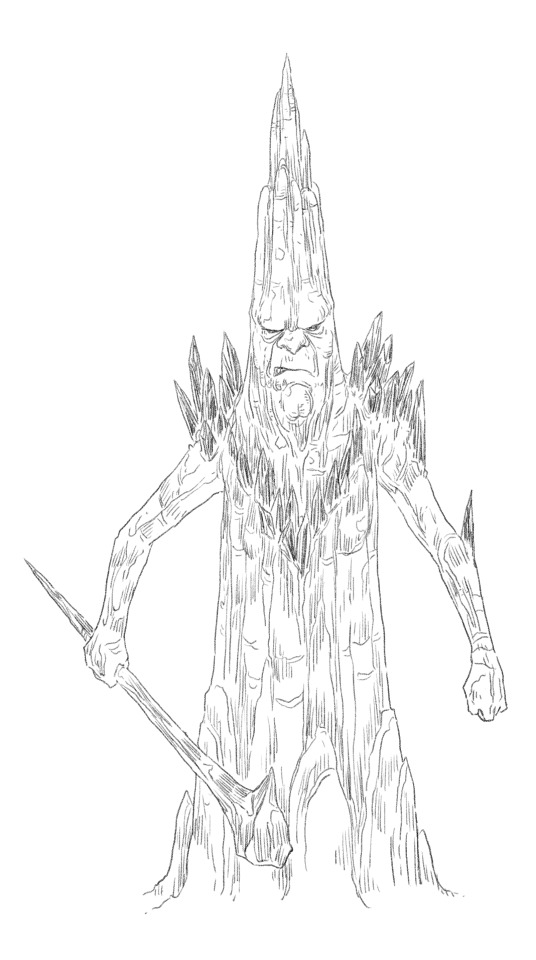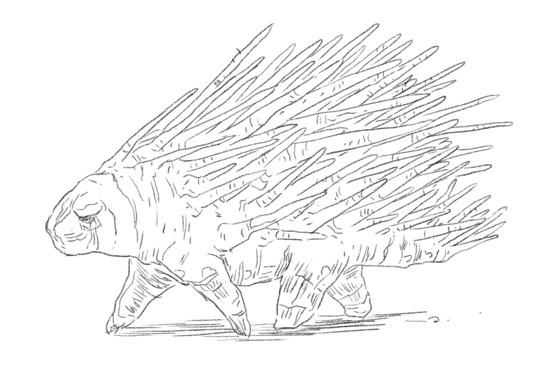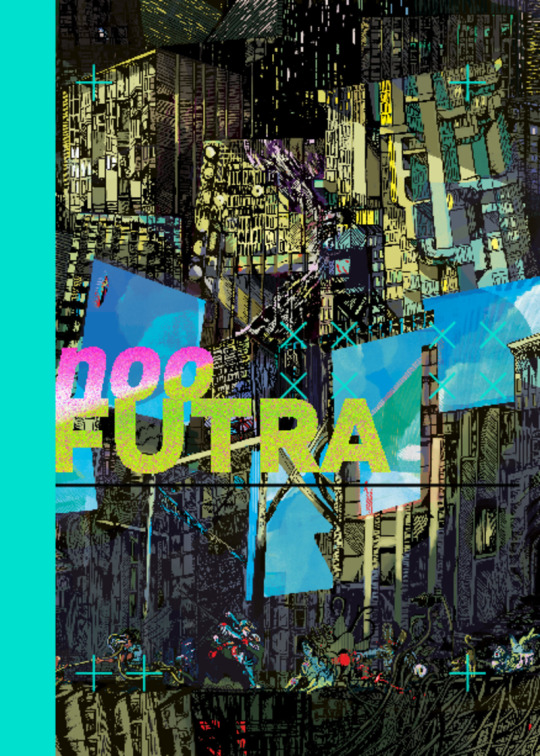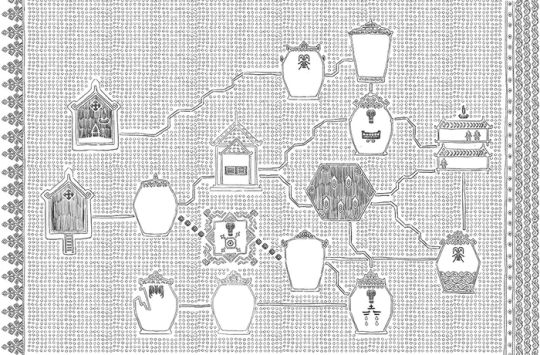#reachoftheroachgod
Text
Caving Dead
Caves love cavers but find them difficult to comprehend. Mistakes occur.
They may not get that you are stuck. They may feel your scratches as amour. They may hear your dying gasps as climax.
Happy to tryst with so exotic a lover, they accept your dead flesh as a seed, and raise your children as their own.
+

SKINFILLERS
Ordinary. Frail. Slinking, sucking, smelling. Smothering kiss. Unprotected.
Like a leather jacket pulling itself up onto your bed.
They wrap about your neck, go for your face, guzzle air from your lips. They swell as you asphyxiate. If punctured, your breath escapes them in phrases:
1: “Watch out that’s pretty loose.”
2: “I’ve swam it before it’s fine.”
3: “Do you have the torch resin?”
4: “It’s a dead knot I know knots.”
5: “Smell that smells weird right.”
6: “Just need to warm up some.”
+

NAILSTEALERS
Ordinary. Frail. Sneaking, stealing, caressing. Cracked nails. Squirming speed.
Cobra-sized, inch-worming, nails pulled open – mouths.
They eat caving equipment: rope; picks; pitons you used to mark the way. They carry whatever they’ve eaten, undigested, fat like snakes that have swallowed rats.
+

HEELDIGGERS
Ordinary. Frail. Lying, leaping, kicking. Shins. Unprotected.
Legs, sticking out of rubble. Tragicomic victim of a cave-in?
Get close and it jumps you, bites your nape. It rides your shoulders. It is a burden: harm dealt to it manifests also in your thighs, your feet. Will take magic to remove.
+++
REACH OF THE ROACH GOD is now at the point where we have to cut stuff for length. These caving dead got the axe, unfortunately.
They were meant to occupy a similar niche as the very excellent Panic Attack Jacks from Patrick's "Veins Of The Earth" -- in that they are visceral reminders of the dangers of merely traversing caves.
But much simpler, more hantu-like? I wanted them to feel more like fauna than undead. The spirits of the dead are just a different kind of living creature, after all ...
+++
( Image sources:
Panel from Grant Morrison's "The Mystery Play";
Art by Mun Kao;
https://twitter.com/MydayNewbie/status/1250346992267481088 )
18 notes
·
View notes
Text
Stalagmite-folk + Process Notes: Overloading the Random Table
Some orientation:
Stalagmite-folk are living, ambulatory speleothems. (They don’t have legs, but glide over mineral surfaces like ice on a floor.) They are organised into families: sibling sets, issue of a local stone-spirit father and the divine Mother Water.
Blind Elephant is a stone father whose marriage has come to a Bad End. So his children, the Blind Elephant family, are exiles.
+

BLIND ELEPHANT, REFUGEE FAMILY
Maybe they’ve met flesh-people before. Or heard stories about daylanders. The novelty that you are distracts them from their troubles.
They know you to be:
Sightless, underground. They keep trying to sneak up and startle you.
Wild and murderous. He treats you like he would a dangerous animal.
Exotic specimens. “Your hair is so pretty! Can I touch it? Wow, stringy!”
Fascinatingly disgusting. “So you cry from your crotch? Can we see?”
Inferior in every way. She will speak over you, and never let you finish.
Poor, malnourished. They keep trying to feed you stalagmite-folk foods.
They have:
A peridot afro so big it messes with their balance. They indulge in too much olivine candy.
Shoulders sprouting jagged carbuncle spikes. The new pyrope supplements are working.
Corrosive breath. They have lava-folk friends, and love the taste of their acid-rich cuisine.
Painful joints. Every move, they grind like a rusty hinge. They drink too many bug slurries.
Rusty skin, streaks at a touch. They bulked up on iron ore, but have stopped working out.
A glowing body, searing hot. Torch resin is a narcotic to stalagmite-folk. They’re an addict.

They travelled with few belongings. Including:
A pet – a rock-porcupine. Will sniff out and try to steal metal objects, to chew on as snacks.
A club of ensorcelled citrine. Any spot it impacts transforms and shatters into yellow jewels.
A set of vials, filled with condiment powders. Any would lacerate your lungs, if breathed in.
A set of finely carved wooden serving platters. Easily scratched. Utterly impervious to heat.
A sword of witch salt. The first flesh creature it touches immediately mummifies. It shatters.
An unfinished younger sister they’d been sculpting. Without parents she will never be born.
Back in their own halls they made their living:
At a crystal farm. They can show you a clear path through the fields. Their family is known for fist-sized amethyst grapes and extra-sharp salt lilies.
As a glassmith. Their workshops were hells of fire and unbreathable fume. They made toy figurines so fine these come alive at their command.
Angling moonfish. The best fishing spots are always in the loneliest caverns; they could lead you down shortcuts or detours known to nobody else.
Practising the gut art. Using their stomachs as chemistry labs, they’d guzzle ingredients, and regurgitate potions. They kept stores of rare materials.
In a crude-oil mine. A nasty business. That liquid demon-stuff harbours all manner of perilous horrors. They are scarred, and trained in fighting arts.
At the creche. Not everybody in a family is interested in caring for younger siblings. Their creche-hall is full of nooks, to play hide-and-seek in.
Few will admit to you the terror they are all feeling. They blindly followed their stone father in his retreat. Without a home, with a wrecked family – who are they, really?
+++ +++ +++
PROCESS NOTES: OVERBURDENING THE RANDOM TABLE
As we crawl to a complete draft for REACH OF THE ROACH GOD, the problem I’ve had to solve for most often is space.
Word count
=> Ballooning page count
==> Added dimensions and weight
===> Shipping costs we may not be able to afford.
I blew much of my word budget on ROTRG first three sections. Not a bad thing, considering these are the full adventure modules. But it does mean things are getting tight, space-wise.
The random NPC generator up-post appears in our stalagmite-folk gazetteer. It is the only set of random tables that chapter gets. It has to:
Generate individual NPCs (who are these stalagmite-folk refugees?)
Detail a specific community (what is the Blind Elephant family like?)
Model non-specific communities and culture (what are stalagmite-folk like, in general?)
+

World-building via random table, I guessss?
A powerful RPG design technology. Brian Yaksha discusses it a lot; his Rakehell is an object lesson for how the principle works.
Swathes of Luka Rejec’s Ultraviolet Grasslands are conveyed via random table. Emmy Allen’s toolbox setting books, Gardens Of Ynn and Stygian Library. The most robust RPG settings tend to do this? It simply makes the most sense.
My favourite recent example is Scrap Princess’s inspired-by-Shadowrun-and-2020s-Muskian-disaster-capitalism NooFutra:
A book of tables and tables and tables of bonkers ideas that mutate play and its world in wonderful ways. (Is it NooFutra or NooFutura? Anyway: it really is wonderful.)
+

One thing that I like to do with the random generators in A Thousand Thousand Islands, because it fits the setting’s themes of porousness, anti-taxonomy, “one thing is always in relation to another thing”-ness –
Which I am now forced to do with ROTRG, out of necessity, simply because
I
Just
Don’t
Have
SPACE
A R G H !
Is this: all the random generators in the book are consciously written as multiple tables, spliced together. Tables that, in a different, better-delineated RPG work, would exist as separate things / lists / rolls – designed for separate purposes and to output separate results.
+
Presented here are the rough thoughts I had in mind, as I was making these d6 tables:
1: Sightless, underground. They keep trying to sneak up and startle you.
2: Wild and murderous. He treats you like he would a dangerous animal.
3: Exotic specimens. “Your hair is so pretty! Can I touch it? Wow, stringy!”
4: Fascinatingly disgusting. “So you cry from your crotch? Can we see?”
5: Inferior in every way. She will speak over you, and never let you finish.
6: Poor, malnourished. They keep trying to feed you stalagmite-folk foods.
This a reaction table + personality generator. (But then it’s a poor reaction table that isn’t also a personality generator.)
Also it’s a micro-aggressions table, meant to communicate how the stalagmite-folk are inclined to treat flesh-based persons. They aren’t Racists. They simply belong to a Superior Civilisation, you know? In a way it is their Burden.
1: A peridot afro so big it messes with their balance. They indulge in too much olivine candy.
2: Shoulders sprouting jagged carbuncle spikes. The new pyrope supplements are working.
3: Corrosive breath. They have lava-folk friends, and love the taste of their acid-rich cuisine.
4: Painful joints. Every move, they grind like a rusty hinge. They drink too many bug slurries.
5: Rusty skin, streaks at a touch. They bulked up on iron ore, but have stopped working out.
6: A glowing body, searing hot. Torch resin is a narcotic to stalagmite-folk. They’re an addict.
Physical attributes generator. (Meeting a minimum standard of gameability, because those are the “cosmetic” details players remember. So not “big afro guy”, but “guy with afro so big it makes him a liability while we’re spelunking”. Stuff like that.)
Plus a list of foodstuffs – detailing the stalagmite-folk’s general relationship to food, and alluding to their relationship with other groups (torch resin would be supplied by the pale-folk).
This here’s an example of word-count constraints determining creature design. The stalagmite-folk have this “you are what you eat” thing going on, mainly because I realised I could merge two random tables together if they did.
1: A pet – a rock-porcupine. Will sniff out and try to steal metal objects, to chew on as snacks.
2: A club of ensorcelled citrine. Any spot it impacts transforms and shatters into yellow jewels.
3: A set of vials, filled with condiment powders. Any would lacerate your lungs, if breathed in.
4: A set of finely carved wooden serving platters. Easily scratched. Utterly impervious to heat.
5: A sword of witch salt. The first flesh creature it touches immediately mummifies. It shatters.
6: An unfinished younger sister they’d been sculpting. Without parents she will never be born.
Simple treasure / magic items table.
But treasure tables aren’t simple anywhere, are they? Info on what the NPC has; what they can do, in play; material culture; what’s valuable versus what’s not in this culture; all that good shit.
1: At a crystal farm. They can show you a clear path through the fields. Their family is known for fist-sized amethyst grapes and extra-sharp salt lilies.
2: As a glassmith. Their workshops were hells of fire and unbreathable fume. They made toy figurines so fine these come alive at their command.
3: Angling moonfish. The best fishing spots are always in the loneliest caverns; they could lead you down shortcuts or detours known to nobody else.
4: Practising the gut art. Using their stomachs as chemistry labs, they’d guzzle ingredients, and regurgitate potions. They kept stores of rare materials.
5: In a crude-oil mine. A nasty business. That liquid demon-stuff harbours all manner of perilous horrors. They are scarred, and trained in fighting arts.
6: At the creche. Not everybody in a family is interested in caring for younger siblings. Their creche-hall is full of nooks, to play hide-and-seek in.
Professions table. Generates an NPC’s skill set.
It also tells you what their work-space was like. Considering that our stalagmite-folk gazetteer strongly suggests a “go explore the Blind Elephant’s home caves and figure out what’s going on” adventure – this tells where a particular NPC could be useful, should they tag along.
And those spatial descriptions also mean that this conveniently serves as a generator for Blind Elephant geography. You could roll on the table a coupla times, look at the spread of your results, and determine whether the Blind Elephant are a family of fisherpersons or miners or artisans.
Also meaning that, possibly, maybe, in theory, you could roll up any stalagmite-folk settlement, since the professions list is meant to communicate typical economic activities that the culture engages in.
+
In my mind I see this stuff as an extension of Brendan / Necropraxis’s overloaded encounter die. That’s a keystone bit of design, in service of RPG procedure and its streamlining.
Could you do the same with RPG setting / adventure design?
What if your weather table was your location generator? What would that look like?
You’d lose granularity. (You’re removing a roll; setting certain weather-to-place relationships in stone). But what would you gain in terms of building the character of the world? (Hail always falls around the region’s stone megaliths, wonder why?)
+
Does any of this work? Is any of this useful for anybody but myself? Don’t know.
Definitely these splicings push towards more specificity – so designers who are trying to make more toolbox-y things would find this dumb / counterproductive.
Is it useful to me?
I know I’m susceptible to overburdening a text. Not information-dense, just dense? Prose that does too much implying, and has left too much unsaid. Descriptions with too few explicit guardrails for players’ / GMs’ imaginations, they just never bother getting onboard.
+

It has been useful, so far. I’m reasonably happy with our draft of the stalagmite-folk gazetteer. I think I experienced something not entirely unlike fun, while writing said draft. (Writing sucks ass; I never have fun writing.)
And I didn’t bust my word-count limit, this time. So there’s that.
+
(Art by Mun Kao. The stalagmite-folk are part of REACH OF THE ROACH GOD, our first book; preorders are open.)
#writing#fantasies#rpgs#reachoftheroachgod#athousandthousandislands#art#stalagmite-folk#randomtables#processnotes#rockcupines
20 notes
·
View notes
Text
Dendeng, In Search Of His Wife

Dendeng was very vain. His wife’s death made him angry; she dared leave him without warning.
He wanted her back. He would break into the City of Peace. A caretaker of that place tried to stop him at the gate, saying:
“If you steal from death you rob your own soul.”
But the caretaker was pale, and scrawny, and spoke softly. So Dendeng paid them no heed.
On the outskirts of the City of Peace he came upon two soldiers. Their spears clashed like hearts beating. Dendeng demanded they stop to show him the way.
The first soldier said: “We desire war. More and more! Give us your shield. Give us your sword.”
The second soldier asked: “What is more precious? The strength of your hand? Or your wife’s touch?”
Dendeng did not like tests. He was mighty, and not in battle only. So he gave the first soldier his sword, and he gave the second soldier his shield.
The soldiers led him to a palace by the River of Hours. At the door there he was greeted by two maidens. Their hair hung like wisps of mountain mist. Dendeng smiled to seduce them.
The first maiden said: “We desire beauty. That which we have lost! Give us your hair. Give us your skin.”
The second maiden said: “What is more precious? The love of others? Or your wife’s loyalty?”
Dendeng considered their words. He decided he was through with lustful needs. So he gave the first maiden his hair, and he gave the second maiden his skin.
The maidens announced Dendeng at the Court of Silence. There sat a prince upon a dais. The prince’s stillness was like a jade figurine; he did not move. Dendeng understood that the prince was mute.
Dendeng asked himself: What was more precious? His loud voice? Or his wife’s laughter?
Knowing the answer, Dendeng offered his tongue to the prince. This the prince accepted, and swallowed, and in Dendeng’s own voice the prince called out: “Come, beloved.”
So Dendeng’s wife appeared.
But she did not run to Dendeng’s arms. Instead she stepped onto the dais, and sat by the prince’s side. For now she was the prince’s wife.
“O Dendeng, who was my husband,” she said. “In life I loved you. Yet you beat me, and went with other women, and treated me as property. Your words were as torture to me. So in death I will do differently.”
At her command soldiers drove Dendeng from the Court of Silence with his own shield, his own sword. And Dendeng fled the palace and the River of Hours.
Finally Dendeng stood before the gate of the City of Peace. There he was unable to leave. He was voiceless, skinless, weak and stumbling – as low as the caretakers of that place.
Dendeng was too ashamed to face the living world again. None of his vanity remained.
+
( Image source:
http://www.collin-key.com/portfolios/toraja-funerals/ )
10 notes
·
View notes
Text
What Do You Find At The Monk's Home?
MONK HOUSES
Outside: vegetables, flower pots. Inside: cots, partition screens. Noteworthy:
1: A heaped pile of orange robes, soiled.
2: Six tiny deities, silver, sharing an altar.
3: A bronze mirror, the width of a pomelo.
4: Letters on a desk. Addressed to a son.
5: A bow, with a quiver of poison arrows.
6: Three sets of black oversashes. Fresh.
Also hidden:
1: Paper talismans, folded into squares, tiled under the sleeping mat. Red ink, prevents bad dreams. Sepia ink, repels ghostly spirits.
2: A small clay jar, linen stopper, in loose earth by one of the stilts. Fish sauce, spicy and rich; if opened its aroma will overpower a room.
3: Dresses, at the bottom of a trunk. Silk brocade, silver thread, swordfish motifs. The swordfish marks their owner as a lowlander royal.
4: A diary. Invisible ink; writings appear when the passphrase is spoken: “Odoyoq.” Details torrid wet dreams starring a roach-faced hunk.
5: Toys, under a board. Phallic-shaped statuary of sumptuous women in sexual congress with snarling beasts. Stained, rubbed smooth.
6: An iron staff, swaddled, stowed in the rafters. One of the cursed Thousand Rods: turns any killing tool it touches into a copy of itself.
+
(Part of REACH OF THE ROACH GOD -- our first A Thousand Thousand Islands book, WIP, and currently crowdfunding.)
#stories#writing#fantasies#monks#roaches#reachoftheroachgod#athousandthousandislands#kickstarters#houses
8 notes
·
View notes
Text
Guardians at the Temple of the Spider
Statues sculpted in the likeness of figures from Udarava’s life -- and therefore holy. They expect veneration. You may give them suggestions, never commands.
In their eyes, monks of the temple are limned in moonlight. To their noses, those who have broken temple rules stink of rotting meat.
+

DOOR GUARDIANS
Buxom facsimiles of Sacred Deer, in high-relief brass, built into their teak doors.
In metallophone voices they finish each other’s sentences. They refuse to let laypersons through. “Gawking at the Temple’s distress.” “Will not nourish your soul.”
Unless you prove you can assist the monks. You do this by assisting them, first. They want:
1: “Scrubs.” “Our skin needs exfoliating.” Removing the verdigris takes a day.
2: “Treats.” “Tamarind candy, extra chewy.” That was Sacred Deer’s favourite.
3: “Garlands.” “Strung from jasmine, orchids, champaca.” One for every antler.
4: “Witnesses.” “Eight credible persons.” Willing to testify to your moral nature.
5: “Arms.” “Tridents are not enough.” Bring them weapons with better magics.
6: “Art.” “Sing to us a story.” If they are moved they will shed tears of mercury.
A pair of door guardians watches every inter-precinct gate.
+

ROOF GUARDIANS
Finial approximations of Laughing Serpent, slithering across tiles, hanging off eaves.
No speech. As playful as otters. Harm them and they curse you: the next time it rains, the downpour curves towards you. Even a drizzle hits like a punch.
One roof guardian for every named building. Confined to their own roof. They freeze into dead metal if removed, and revive when they are returned to a reasonably roof-like structure.
+

STONE GUARDIANS
Anthropomorphised versions of Vigorous Spider. Their mouths smile. They do not speak.
Three heads, three torsos, two legs. They move like stop-motion monsters. Each is subtly different; this one has:
1: Iron talons like grappling hooks. They can climb.
2: A crown on each head, shaped like stupas. Gold.
3: Tusks like a boar. They spit fleshing-eating venom.
4: A rhino mount. Its horn breaks bone with a touch.
5: Wings on their backs. Stone, stubby and useless.
6: A belt with a ruby. If pressed to it you fall asleep.
Sneaking past their four pairs of eyes is tough. They enforce Temple rules. They chase down any rulebreakers they smell, and drag these sinners to the Penance Hall.
+++
(For A Thousand Thousand Islands.)
( Image sources:
https://en.wikipedia.org/wiki/Brihaspati
https://en.wikipedia.org/wiki/N%C4%81ga
https://en.wikipedia.org/wiki/Phra_Phrom )
10 notes
·
View notes
Text
Roach Maladies

Odoyoq was never mightiest among his siblings; he prevailed by other means. Ma Blat’s brood carries particular virulent malaises.
You are showing symptoms:
1: Eggs. The site of your wound swells. After a day, a roach swarm emerges. Concentrate, and you feel what they feel.
2: Belly spasm. Hereafter, when you defecate, you pass roach-like, jar-shaped droppings. This symptom is incurable.
3: Parasites. Wriggling under your skin. You require twice your usual rations. Each day the worms double in size.
4: Fever. Breaks in three days. Hereafter, you sweat milk. Attracts roaches. If they drink it they obey you for an hour.
5: Vomiting. Last a day. Hereafter, only food that has gone through another creature’s digestive tract will nourish you.
6: Rashes. Spreads from the site of your wound. The itch is distracting; after three days, you only think of scratching.
Attempting treatment requires a clean environment.
Catch three roach maladies? Reality itself begins to see you as part of Ma Blat's brood; roach repellents work against you.
+
( Image source: https://www.pinterest.com/pin/740912576202206312/ )
10 notes
·
View notes
Text
Udarava Romances The Spider

In those days demons haunted our country. Night was feared and dawn dreaded, for every morning brought new tears: a missing mother, an absent son, a shredded cradle --
And never a body enough to bury.
On such days Udarava would not control his temper. As evil stalked the land, his heart flashed hot. With wanton arts his dagger bit demon flesh:
Cleaving head and horn;
Snapping tooth and talon;
Puncturing palm and pit.
Three moons Udarava danced his war dance. His steps led him to the mountain fastness of Vigorous Spider, who was then a mighty princess of demon-kind. She called from on high, when she spied him at her gate:
“O warrior! Why should we fight? Are we not kin, in nature? See what skill you have, in making violence!”
So Udarava looked at the path he left behind him. He saw:
Homes breached and burning;
Fields stamped and spoiled;
People mute and mangled.
Party to such evil, Udarava wept. His heart drowned in regret. He called out to his mother, Sacred Moon, begging forgiveness. Instead, her spirit spoke in his memory:
“O my son! You carry your father’s blood. You do not carry his nature! You need not continue his sins!”
Recalling this, Udarava knew peace. He knelt there on the mountainside. When Vigorous Spider fell upon him, he did not flinch -- he did not fight, though he was:
Squeezed by eight arms;
Pierced by eight spears;
Kissed by eight mouths.
With his legs and hands Udarava returned Vigorous Spider’s embrace. He would not let go. Though he whimpered, though he murmured, she could not get free. She found his submission very heavy.
And their weight together became so great, the ground itself could not hold them. A crack opened in the mountain. Into this crack toppled both warrior and princess, entwined --
Never to be seen for a hundred years.
+
( Image source: https://commons.wikimedia.org/wiki/File:Thiania_bhamoensis_8.jpg )
7 notes
·
View notes